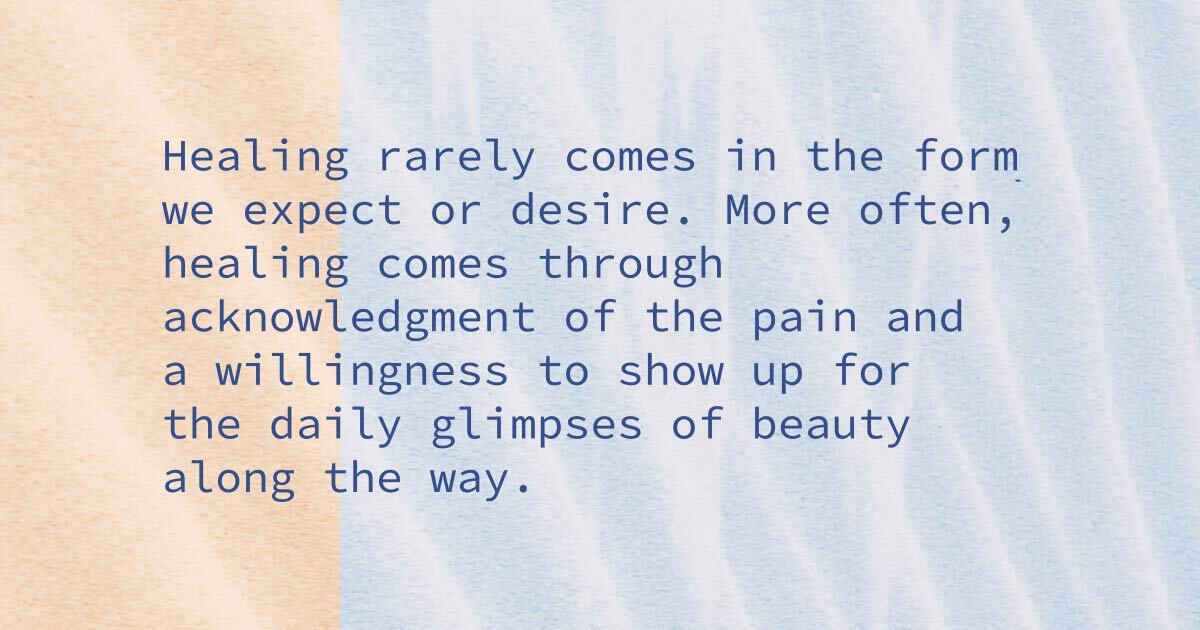Note: This piece discusses trauma and sexual assault in detail. Please use your discretion.
Today I had 100 flashbacks before breakfast.
I lay motionless under the weight of your absent body
And felt your ghostly fingertips encircle my neck,
Your teeth sinking into the side of my face.
Your voice still reverberates in my ears—
You’re so weak.
You’re stupid.
Do you really think anyone gives a crap about you?
When the world is still, my mind races
And when peace surrounds me, I wage war with the wounded beast within.
I’m steadily approaching the 10-year anniversary of my PTSD diagnosis. Never would I have imagined I would survive to this day—to graduate high school, then college, maintain a stable job, and find community.
I also never imagined that I would still be dealing with this. I’ve often thought that 10 years is long enough. I’ve done my time, struggled, suffered, learned, and grown—so shouldn’t I be done with this pain? When will I catch a break?
I’ve lived through years veiled by dissociation that I no longer remember. I’ve experienced paranoia from simply opening the door to exit my dorm room to go to class. I’ve had visions of strange men attacking and hurting me in the midst of a crowded room. And now on a daily basis, I have flashbacks several hundred times a day that zap my body of its strength and leave me utterly worn out.
Compounded by sleep deprivation, I am all too often weary and exhausted. On the days when I wake up at three AM and have a dozen flashbacks before I open my eyes, I am faced with a choice: to lay in bed and succumb to the torture of my mind, or to choose to roll out of bed, make coffee, light a candle, and show up for what the day has to offer. It is all too easy for me to throw a grand pity party for myself and invite all the ghosts of my past who whisper to me: You may as well give up and throw in the towel.
I would like to say it’s gotten easier, that I’m doing better than I was when I started this journey, and while I’ve put in hours and months and years of work, and have grown and changed through this process, I can’t rightly say that it’s any easier than it was when I was 13 and in middle school. And, while PTSD is the most difficult challenge I’ve had to navigate, in many ways, it’s gifted me with treasures I never would have known without it.

I’ve been met with compassion and kindness by therapists who listen to my story and fight for me, even when I have given up hope. I’ve known the love of friends who carry me up the stairs on nights when dissociation and depersonalization leave me without the ability to move my legs. I’ve experienced the utter bliss of a warm sunny day with no flashbacks or dissociative episodes. But most of all, I’ve learned of the strength found in humility—in moments when I am at my very weakest, those are the very same moments where I encounter love and compassion and glimpses of a world untouched by sorrow. And in those moments where we reveal our own brokenness, vulnerability, and perceived weakness, we make space for others to share their own, too.
While I still cling to a distant hope of healing, I understand that healing in the way I desire may never come to pass.
But maybe that’s the point—healing rarely comes in the form we expect or desire. More often, healing comes through acknowledgment of the pain and a willingness to show up for the daily glimpses of beauty along the way.
Sometimes healing comes in the flickering candlelight and steaming coffee at three in the morning, or laughter on the face of a dear friend, or moments of stillness and empathy in the presence of one who knows your story in a way no one else does. I used to pray for healing, but now, I pray for the humility to be seen and known and in turn to see and know those around me. Maybe “being healed” is an illusion imposed by a society that values end goals over the process. Maybe there is more to life than getting rid of the suffering and pain and maybe there is beauty to be found in the midst of our darkest moments. Perhaps there is no singular destination to this journey called life, but perhaps the journey is worth it in its own right.
You are not a burden. The heavy you carry deserves to be shared, to be seen, to be known. We encourage you to use TWLOHA’s FIND HELP Tool to locate professional help and to read more stories like this one here. If you reside outside of the US, please browse our growing International Resources database. You can also text TWLOHA to 741741 to be connected for free, 24/7 to a trained Crisis Text Line counselor. If it’s encouragement or a listening ear that you need, email our team at [email protected].
Lisa
Beautifully shared. I’ve been running from my trauma my whole life. I try to beat it out of me, jump on top of it and smash it down, run as fast as I can from it, and it always leads me back to right here. Having to accept this. Not be terrified of myself. Thank you for sharing. Thank you. Thank you.